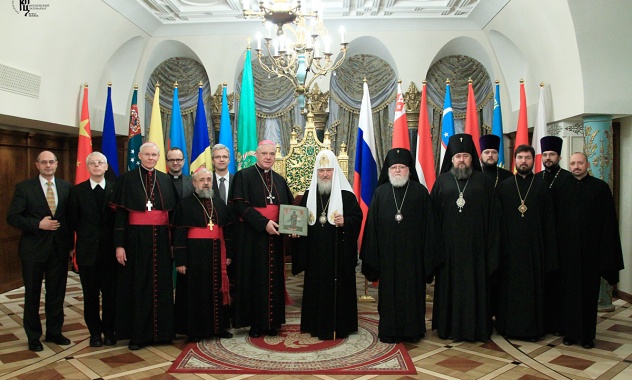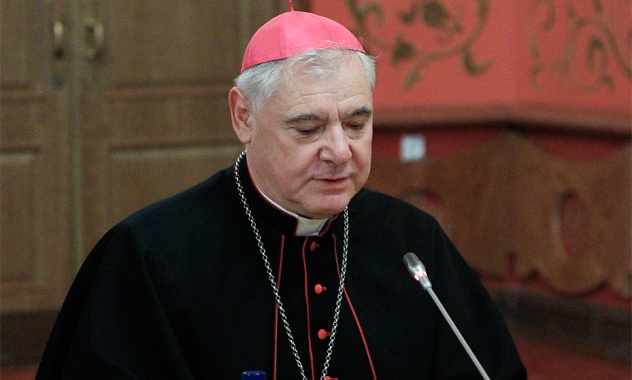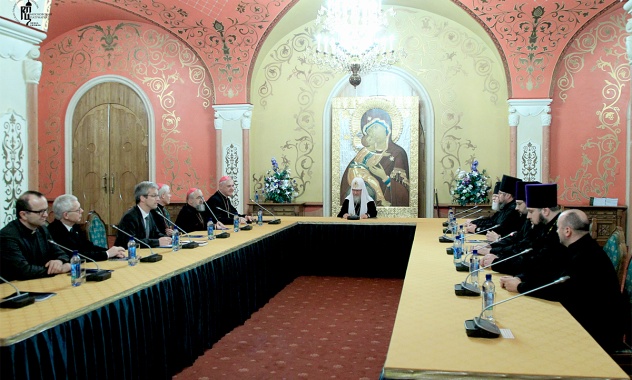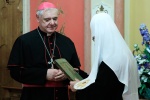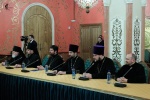Patriarch Kirill meets with participants in the 7th theological conversations between Russian Orthodox Church and German Bishops’ Conference
On December 6, 2011, His Holiness Patriarch Kirill of Moscow and All Russia met with participants in the 7th theological conversations between the Russian Orthodox Church and the German Bishops’ Conference (Roman Catholic Church), at the Church of Christ the Saviour.
Participating in the meeting from the Moscow Patriarchate were Archbishop Feofan of Berlin and Germany, Archbishop Philip of Poltava and Mirgorod, Bishop Seraphim of Bobruisk and Bykhov, Archpriest Dimitry Sizonenko, DECR secretary for inter-Christian relations, and Rev. Alexander Vasyutin and Deacon Alexey Dikarev, DECR staff members. The German Bishops’ Conference was represented by Bishop Gerhard Ludwig Muller of Regensburg, Bishop Gerhard Feige of Magdeburg, Auxiliary Bishop Nikolaus Schwerdtfeger of the diocese of Hildesheim, Professors A.-P. Rethman, J. Freitag, E. Schockenhoff, and C.-G. Justenhofen.
His Holiness welcomed the guests and gave the floor to Bishop Gerhard L. Muller of Regensburg. ‘I am in this church for the third time already’, he said, ‘I first came for the funeral of your predecessor, His Holiness Patriarch Alexy II, and the second time for your enthronement’, he said. The participants in the talk were presented with Patriarch Kirill’s book ‘A Pastor’s Word’ in German, which deals with important problems of the Church’s life in history and in the modern world.
He also stated that participants in the 7th theological talks devoted to the theme ‘Christian Understanding of Human Rights’ set themselves as their aim to search for ways of bringing the positions of various confessions on human dignity in its religious dimension ever closer together. The most important thing in the Christian understanding of human rights, he said, was the fact that ‘we all are children of God and Christ is the head of the Church, who unites us with each other’.
Bishop Muller presented Patriarch Kirill with an Icon of Our Saviour, which has a considerable historical value. Before the 1917 Revolution, this icon, which dates back approximately to the 17th-18th century, belonged to the entrepreneur and benefactor S. Ryabushinsky who had collected icons to become one of the largest collections in Russia. After the revolution, the icon together with a large part of Ryabushinsky’s collection found itself at the Tretyakov Gallery and later was sold at an auction in Europe. In the mid-20th century, it came to the family of the Bishop of Regensburg who had preserved it and handed it over to Patriarch Kirill, saying, ‘As an icon should not be in a museum but in a church, I ask Your Holiness to accept this icon of our Saviour whose image unites all Christians’.
Patriarch Kirill thanked the Bishop of Regensburg for the gift. He said he was pleased with the fact of holding in Moscow the 7th theological talks between the Russian Orthodox Church and the German Bishops’ Conference. He stressed that dialogue with other Christian confessions on the level of both bilateral and multilateral relations was aimed to draw nearer together their positions and to overcome disagreements between Churches, saying, ‘Whatever we may be engaged in, our agenda always implicitly contains this desire to overcome differences. This effort of Churches and Christian communities aimed to overcome the existing Christian divisions can and must make a positive impact on the state of today’s society’.
‘The subject of human rights is an anthropological theme’, he continued. ‘And anthropology has become a point of division today, including between bearers of Eastern and Western cultures, in the broadest sense of this word, not only in the sense of religious culture. If we speak of the moods including in the Russian society, a considerable part of the criticism levelled against the Western society has to do precisely with the sphere of anthropology, just as, I believe, the critical view of Western people with regard to Russia and the East’.
According to His Holiness, the positions taken by the Orthodox and the Roman Catholic Churches on problems of modern anthropology and its interpretation are rather close and even unanimous – which is a very positive and optimistic signal. In this sense, ‘the two Churches can and must be a bridge helping, among other things, to overcome cultural differences between our societies’, he said.
‘In a broader context, a search for a common Christian cultural and ethical basis in the life of our societies is a right path and taking it, we can help people overcome the division’, the patriarch said. He expressed the conviction that if Christian values had prevailed today in East and West, it would have removed many problems involved in the division in today’s Europe: ‘The problem is that the social and philosophical development is deviating from Christian values, and we are losing what has always united the European culture’.
Patriarch Kirill believes that given all the religious pluralism, the Eastern and Western societies have no common basis other than Christian. ‘If people in East and West are to see each other as brothers and like-minded people, we should return to common Christian values’, he said.
‘The Catholic and the Orthodox Churches are facing very heavy challenges today, and I pray that these challenges may be overcome by the Churches. Our task is to defend the moral dimension in the life of both the individual and society. To do it today is not an easy task, especially in a civilization which has abandoned the notion of sin and which is blurring the borderline between good and evil. It is a civilization in which the only criterion for defining good and evil is the secular law. We know that a legislative act is not a sufficient criterion because law is based on morality, and if morality is destroyed, law is destroyed as well’.
Patriarch Kirill expressed the profound conviction that the survival of the human civilization depends of the state of morals. ‘Searching for common responses to complicated problems of today, the Orthodox and the Catholics make an essential contribution to the cause of peace and justice and the building of culture and communication between people who belong to different political and cultural systems; they make their own contribution to a better future of our planet’, he said.
Patriarch Kirill presented the Bishop of Regensburg with an Icon of Our Lady of Kazan, and every participant in the meeting received collected articles on the work carried out by the Patriarch this year and a medal coined on the occasion of his enthronement.
DECR Communication Service







